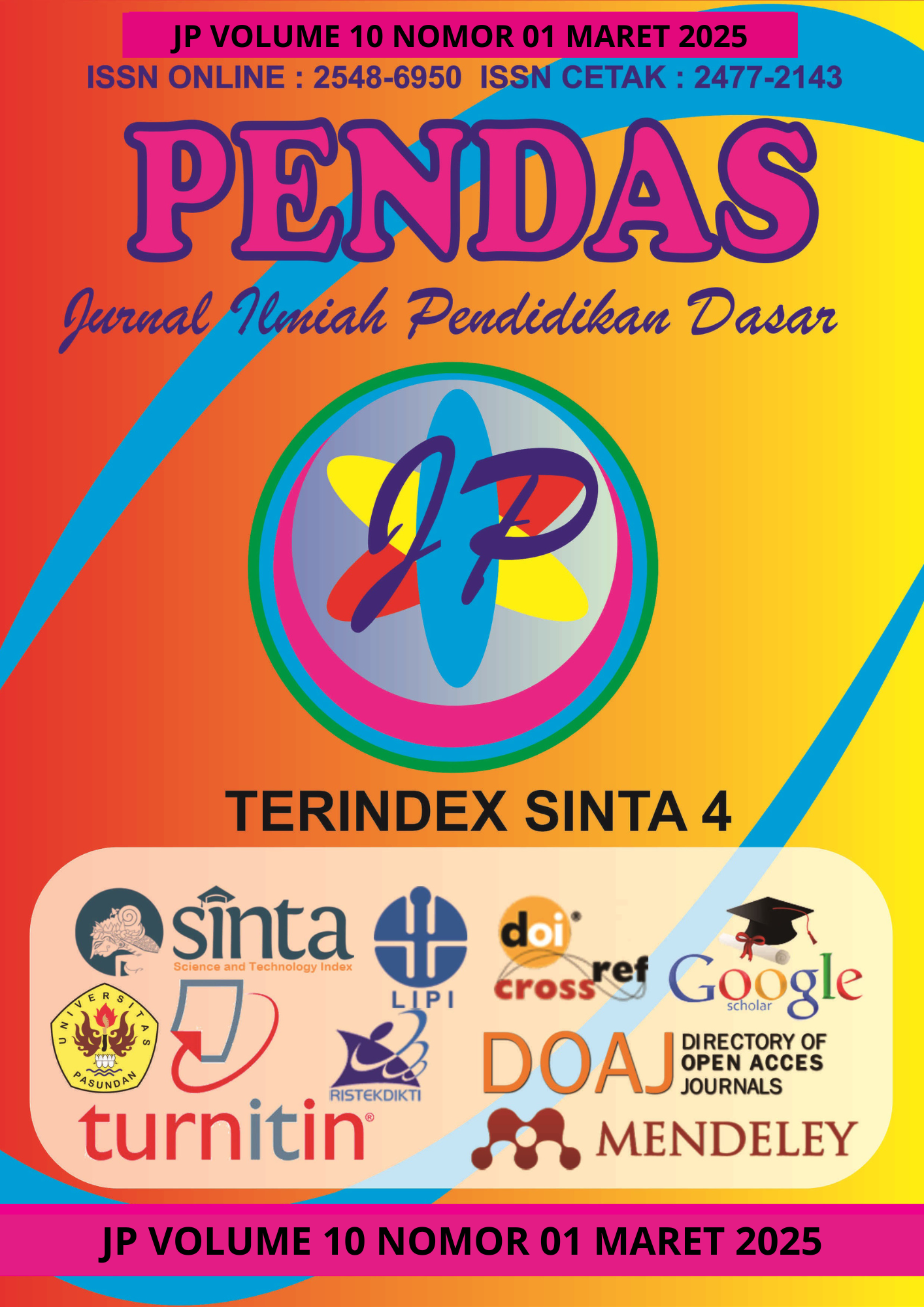PENGEMBANGAN MEDIA KOMIK ELEKTRONIK BERBASIS POTENSI LAUT BENGKULU UNTUK MENINGKATKAN LITERASI KEMARITIMAN SISWA SD
DOI:
https://doi.org/10.23969/jp.v10i01.19982Keywords:
electronic comics, maritime literacy, Bengkulu marine potential, elementary school studentsAbstract
This study aims to develop an electronic comic-based learning media utilizing the marine potential of Bengkulu, designed to effectively improve maritime literacy among elementary school students. The research uses the Research and Development (R&D) method with the Borg and Gall model. The study subjects include material experts, presentation experts, teachers, and students. The validation results show that the electronic comic media is considered "very valid" by both the material and presentation experts. User feedback from teachers and students also indicates that the media is "very feasible." Operational testing of the product was carried out through two learning cycles. In cycle I, the average maritime literacy score of students reached 66.33%, which significantly increased to 84.50% in cycle II. Thus, the electronic comic media based on the marine potential of Bengkulu is proven to be effective in enhancing maritime literacy among elementary school students. This media not only captures students' interest but is also relevant to local potential, making it a promising alternative learning medium based on local wisdom.
Downloads
References
Buckley, P.J, Pinnegar JK, Painting SJ, Terry G, Chilvers J, & Lorenzoni. (2017) Ten Thousand Voices on Marine Climate Change in Europe: Different Perceptions among Demographic Groups and Nationalities.
Cava, F., Schrodinger, S., Strang, C., & Tuddenham, P. (2005). Science content and standards for ocean literacy: A report on ocean literacy.
Departemen Kelautan dan Perikanan, S. S. K. D. K. I. (2008). Laporan Sosialisasi Nilai-Nilai Kelautan.
Effendy, M. (2017) dalam https://www.kemdikbud.go.id/main/blog /2017/05/mendikbud-kemaritiman-bisadisisipkan bisadisisipkan-di-hampir-semua-matapelajaran-dan-kegiatan-di-sekolah.
Hakim, A. F. (2018). Pengembangan Komik Digital Sebagai Media Pembelajaran Alat-alat Pembayaran Internasional Pada Materi Perekonomian Terbuka. Skripsi, UNY.
Kustandi, C & Darmawan, D. (2020). Pengembangan Media Pembelajaran. Jakarta: Kencana.
Lasabuda, R. (2013). Pembangunan Wilayah Pesisir dan Lautan Dalam Perspektif Negara Kepulauan Republik Indonesia. UNSRAT : Jurnal Ilmiah Platax. 1 (2) 93-101.
Matsumoto, K., Takeno K., Urata M., Matsubara M., Kato T., Suzuki N., and Hayakawa K. (2017). Evaluation of Marine Education‘s Effect in Elementary and junio high Schools Analysis of the Value Consciousness Using Text Mining. American Journal of Educational Research, 5 (1): 76-81.
Masydzulhak. (2007). Pengelolaan Sumberdaya Wilayah Pesisir Kota Bengkulu. In Pesisir dan Lautan 8 (1), 32.
Marrero, M.E. & Mensah, F.M.M. (2010). Socioscientific Decision Making the Ocean: The Case Study of 7th Grade Life Science Students. Electronic Journal of Science Education. 14(1)
NOAA (National Oceanic and Atmospheric Administration) (2013). Ocean Literacy The Essential Principles and Fundamental Concepts of Ocean Sciences for Learners of All Ages. Washington, DC: NOAA.
Payne, D. L., & Zimmerman. T. D. (2010). Beyond Terra Firma: Bringing Ocean and Aquatic Sciences to Environmental and Science Teacher Education. In The Inclusion of Environmental Education in Science Teacher Education, edited by A. M. Bozdin, 81– 94.
Sari, W. K. & Wilujeng, I. (2020). Investigating the Need for Ocean Literacy in the Indonesian Science Classroom, Advances in Social Science, Education and Humanities Research, 528, 702-707.
Santoro, F., Selvaggia, S., Scowcroft, G., Fauville, G., & Tuddenham, P. (2017). Ocean Literacy for All: A Toolkit. UNESCO Publishing.
Strang, C., DeCharon, A., & Schoedinger, S. (2007). Can you be science literate without being ocean literate? Current: The Journal of Marine Education, 23(1), 7–9.
Sugiyono. (2018). Metode Penelitian Kuantitatif,Kualitatif dan R&D. Bandung: Alfabeta.
Tran, L. U., Payne, D. L., & Whitley, L. (2010). Research on learning and teaching ocean and aquatic sciences. NMEA Special Report 3: The Ocean Literacy Campaign, 22–26.
Wang, F., Kinzie, M. B., Mcguire, P., & Pan, E. (2010). Applying Technology to Inquiry-Based Learning in Early Childhood Education. Early Childhood Educ Journal, 381–389.
Winarni, E. W.(2018). Teori dan Praktik Penelitian Kuantitatif Kualitatif Penelitian Tindakan Kelas (PTK) Research And Development (R&D).Jakarta: Bumi Aksara.
Downloads
Published
Issue
Section
License
Copyright (c) 2025 Pendas : Jurnal Ilmiah Pendidikan Dasar

This work is licensed under a Creative Commons Attribution 4.0 International License.














































